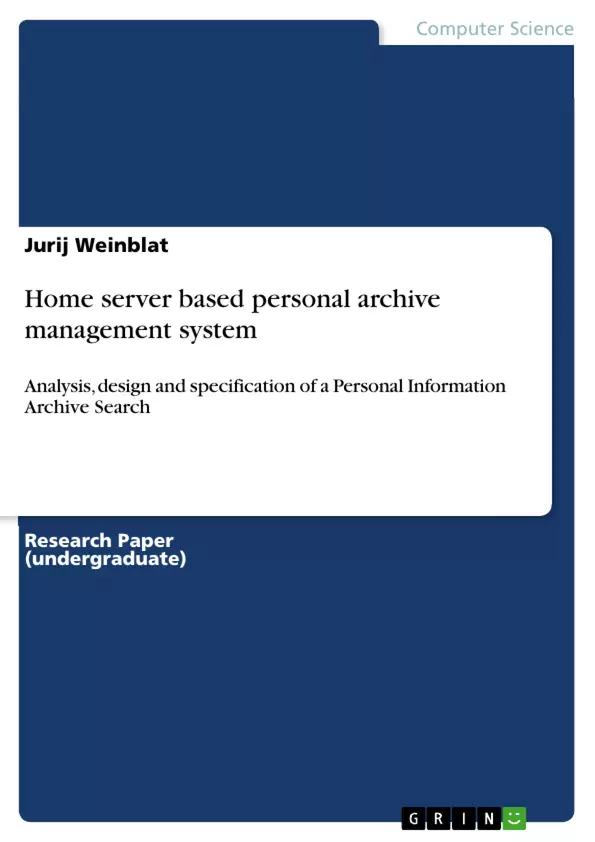This paper describes the concept of a home server which stores all the documents of all members of a household independent on the device on which the documents were created and let each member retrieve only his own documents. Such an approach combines the advantages of storing documents on local hard drives and in the cloud and avoids some relevant disadvantages of these storage locations. The integration of calendar appointments as another source of context information of the home server and preview pictures are new functionalities which might improve the performance of the search and help the user to identify relevant documents easier. Moreover it is explained how the home server and these new functions can be evaluated without ignoring the specific characteristics of such a system. The problems of this concept are also stated. They must be addressed in the future.
Inhaltsverzeichnis (Table of Contents)
- Motivation
- Overview of the objectives
- Functional description
- Implementation plan
- Evaluation plan
- Conclusion
- List of references
Zielsetzung und Themenschwerpunkte (Objectives and Key Themes)
This paper outlines the concept of a home server (HS) designed to store all documents belonging to a household, independent of the device on which they were created. The HS aims to combine the benefits of local storage and cloud storage while mitigating their drawbacks. It offers a centralized archive accessible to all household members, allowing them to retrieve their own documents through a web interface. The paper also emphasizes the integration of calendar appointments as context information and the implementation of preview pictures to enhance search performance and document identification.
- Personal Information Management (PIM) in the context of Human Digital Memories (HDMs)
- Home server-based storage as an alternative to local storage and cloud storage
- Integration of context information from calendar appointments
- Document preview functionality for efficient search and relevance assessment
- Evaluation methodology for the proposed home server system
Zusammenfassung der Kapitel (Chapter Summaries)
- Motivation: This chapter introduces the concept of Human Digital Memories (HDMs), highlighting the increasing size of personal archives and the need for efficient retrieval methods. It discusses the limitations of local storage and cloud storage solutions, motivating the development of a home server-based system.
- Overview of the objectives: This chapter presents the proposed home server solution, describing its key features and functionalities. It emphasizes the central role of the home server in storing and managing household documents and the provision of individual user accounts for secure document access.
- Functional description: This chapter delves into the system's functionalities, outlining the supported document formats and the integration of context information from calendar appointments. It discusses the importance of event-based context information, meta information, and the use of open-source search systems like Lucene for efficient retrieval.
Schlüsselwörter (Keywords)
Home server, Personal Information Management (PIM), Human Digital Memories (HDMs), document storage, context information, calendar appointments, document preview, search system, Lucene, evaluation methodology.
Frequently Asked Questions
What is a home server-based archive management system?
It is a centralized system within a household that stores documents from various devices (PCs, smartphones), combining the privacy of local storage with the accessibility of cloud storage.
How does the system use calendar appointments for search?
Calendar data provides context information. For example, if you created a document during a specific meeting, the system can link the document to that calendar event to make retrieval easier.
What are Human Digital Memories (HDMs)?
HDMs refer to the comprehensive collection of digital data an individual creates or encounters throughout their life, which requires advanced PIM (Personal Information Management) tools to manage.
Why are preview pictures important for the system?
Preview pictures allow users to visually identify documents quickly without opening them, which significantly improves the efficiency of searching through large personal archives.
What are the disadvantages of pure cloud storage?
Disadvantages include dependency on an internet connection, ongoing subscription costs, and potential privacy/security concerns regarding personal data stored on external servers.
- Quote paper
- Jurij Weinblat (Author), 2012, Home server based personal archive management system, Munich, GRIN Verlag, https://www.grin.com/document/265691



